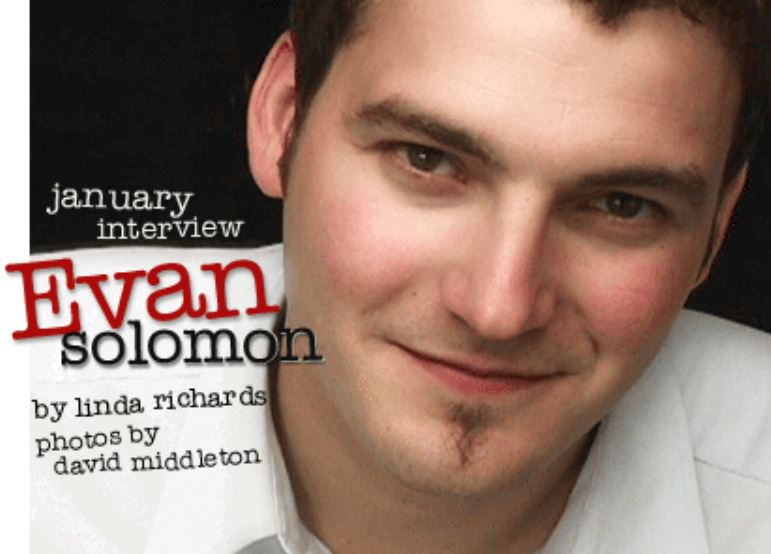Portrait of a CTV hero as a young man
Big shout-out to CTV’s Evan Solomon for doing such an outstanding job on the streets of Ottawa, covering the illegal occupation. The dazed and confused have been shoving him, spitting at him, calling him a Nazi. All because he’s getting right down into the front lines to show us what’s happening. Seeing him in action, suddenly I remembered that I interviewed Solomon back in 1999, when I was working as a literary journalist and he published a novel called Crossing the Distance. Does the ensuing report shed any light on the man? Voila! thanks to the wonders of cyberspace, you can judge for yourself.
Evan Solmon heard two conflicting voices in his head. He was travelling by bus, a 26-hour journey, between Katmandu and Darjeeling. The year was 1992. Solomon was 24 years old and he’d recently done some volunteering at Mother Theresa’s mission in Calcutta: “Grunt work. Anybody could do it.”
There, Solomon met people, he said this week [May 15, 1999], “who’d dedicated their whole lives to helping others. I knew I’d never be able to spend my life that way. But the experience kicked off an internal debate.”
Hence, the two voices — that of an overzealous relief worker and a too-detached observer. In Solomon’s impressive first novel, Crossing the Distance (M&S), the two have become flesh-and-blood adversaries — and brothers. The one has gone beyond self-righteousness into bloody-minded activism; the other beyond detachment into callousness.
As a radical environmentalist, the first brother, Theo, causes the death of a logger in B.C. The second brother, Jake Jacobson, is reminiscent of Jerry Springer — a TV personality who hosts a sensationalistic talk show called The Jake Connections. He’s also the novel’s main narrator. And as the story begins, he discovers his girl friend, a celebrity author, shot in the head and bleeding to death.
Jake provides Solomon with an entry into the world of network television, and the author makes the most of it. He paints a broad-strokes portrait of shameless, shallow and exploitive media types ready to abandon any principle, exploit any tragedy or betray any relationship if such action will move them up the careerist grease pole.
Solomon lays on it on a bit thick — oh, these people are despicable — yet includes enough authentic detail that the characters and melodramatic narrative become almost believable. But, hey, this is satire, after all: the characters are meant to be overblown. The Toronto-based Solomon, who co-founded and edited Shift magazine, comes by his vision honestly. He has worked for almost five years as a CBC-TV NewsWorld host — first of Future World, lately of Hot Type.
And before that? Born and raised in Toronto, Solomon attended McGill University in Montreal, where he earned a bachelor’s degree in English and religious studies, and a master’s in religious studies, focusing on myth and ritual. He also wrote short stories, acted and had three plays produced. After graduation, Solomon and a friend co-founded
Shift — ” we wanted to be part of the storytelling culture” — originally as a quarterly.
Solomon then went travelling for a year, mostly in Asia, though he continued to serve as a long-distance editor. Back in Toronto, he turned Shift into a monthly, landed his first TV job and turned his attention to articulating and dramatizing the internal debate that had begun in India.
Solomon doesn’t see his take on TV as being entirely dark, and he refuses to apologize for writing serious fiction while working in television. “We live in a culture that doesn’t support writers,” he said over lunch. “Writers have to make a living somehow.”
Not incidentally, the TV milieu in which he earns his daily bread also provided relatively fresh material for this ambitious novel — the fast-paced, urban lives of nasty people on the make.
Solomon sees Crossing The Distance as “a redemption story — not like in Hollywood, but redemption the way a river runs, meandering like a choked-up creek. There’s no Niagara Falls at the end of it.” What Solomon is driving at, without giving away the plot, is that Jake moves from being the quintessential witness, and nothing else, to becoming “the author of his own life.”
And, surprise, the narrator has already announced this theme on the first page of the novel: “Betrayal isn’t something you choose, it’s something that chooses you. I know that more than ever now, especially when I think about the events that came together to destroy the people I love. Of course, my memory of things is different from that of the police or the newspaper reporters or the producers making a movie of the week; that’s no surprise. We’re all spinning out versions of the truth until the facts disappear and everything becomes a matter of belief.”
There’s authority in that opening. And, in everything that follows, a seriousness of purpose, as well as an obvious willingness and ability to wrestle with large themes. Solomon hasn’t written a great novel here. But he’s 31 years old. And he’s announced his arrival with panache. This is no one-book author. Solomon’s here to make a mark.
